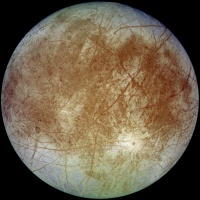Template:Infobox
The Krayiss System is a system in the Outer Rim Territories consists of five planets, of which one is Krayiss II, one of the five sacred Sith planets.
The Nache Belfia, a hyperlane that passes through each sacred planet, kept the system connected to the Sith Empire.
Krayiss System
The Krayiss System is located in the Esstran Sector of the Stygian Caldera Nebula, Grid Coordinates: R-5.
This sector contained the Sith Empire (Pre-Republic) and had in total over 120 planets that were habitable. The Stygian Clandra Nebula surrounds the Sith Territory and attracted the attention of people from other sectors who eventually integrated into Sith society.
Running around in the sector is the Nache Bhelfia, a circular Hyperlane which connects the ancient Sith’s six sacred worlds: Ziost, Khar, Delba, Rhelg, Korriban and Krayiss II.
Krayiss Prime
At the centre of the Krayiss system is Krayiss Prime. The star is small and cool by stellar standards, glowing a deep orange. Had Krayiss Prime been much larger, Krayiss II, which lies in its habitable zone, would be considered too hot for most life to exist. Scans indicate that Krayiss Prime is around halfway through its supply of hydrogen, giving it many more millions of years before entering the next stage of stellar evolution.
Krayiss I
Krayiss I, is a tiny, rocky world that is far too close to the star to make any exploration possible. It is completely devoid of any useable resources, lacking even an atmosphere. The proximity to the star means that it is not even hit heavily by comets and meteors.
Krayiss II
- Main article: Krayiss II
 an artist's impression of Krayiss II
an artist's impression of Krayiss II
Krayiss II is a barren, rocky world. However it is clear that there have been signs of life in the past. It is certainly habitable, given it is near the centre of the system’s habitable range. The only major drawback is that the planet lacks water.
Asteroids
Close to Krayiss II is a small asteroid field. Given the relative lack of density of asteroids when compared to other asteroid fields, it is suspected that they were created from the collision of two smaller planetoid objects early in the Krayiss system's history. Few of these asteroids have been shown to yield anything useful.
Krayiss III
Krayiss III is an unusual entity. It is a gas giant that appears to possess no satellites. Initial attempts to scout the atmosphere for useful materials resulted in the probe being crushed under the immense atmospheric pressure. No further recon missions to the planet are planned, as what few results it returned indicated little to no useful gasses, other than a small quantity of water vapour.
Krayiss IV & V
Krayiss IV and V are virtually twin planets. Both are icy, middle-sized planets, many millions of miles from their nearest neighbour. The main difference between the two is tectonic activity.
 Krayiss IV
Krayiss IV
Krayiss IV is totally inert, lacking even volcanoes, or other signs that it ever possessed such activity. Its sister world, on the other hand, is covered in volcanoes that constantly spout thick, black smoke into the atmosphere. The smoke cover is thick enough that it is nearly impossible to land a conventional spacecraft upon the surface.
Probe scans indicate large amounts of water ice that may be useful for supplying extended operations on Krayiss II.
Both planets have an atmosphere that, whilst not toxic, is unable to support most species; there are large quantities of methane in particular. Krayiss V also possesses a large amount of Carbon Dioxide due to the volcanic activity. If the planet were closer to the star, the planet would possibly have suffered from a runaway greenhouse effect, sending its temperatures skyward. As it is, it is still notably hotter than its sibling.
Krayiss IV's average surface temperature is minus sixty degrees, whilst Krayiss V has an average of minus thirty-five degrees, some of the surface ice even beginning to melt during particularly warm summers where equatorial temperatures may reach as high as five degrees. This would make Krayiss V the preferred source of water for Krayiss II's occupiers.
Trade Routes
File:KrayissTradeArcownage.jpgThe Krayiss System's position in Sith Space.
Nache Bhelfia
The Nache Bhelfia is a hyperlane trading route that cuts through Sith Space.
Once linking the Sith worlds of Ziost, Khar Delba, Rhelg, Krayiss II, Korriban, Ch'hodos, and Nicht Kar, the route now enables easy navigation through Sith Space for the Brotherhood's combined fleet.
The Nache Bhelfia intersects four main hyperlane trade routes, thus enabling the Brotherhood to move swiftly through the Outer Rim Territories. These lanes are the Daragos Lane, Kamate Krote, Zorfe Trete, and the Kamate Aegit.
This hyperlane trade route is imperative to the Brotherhood's manoeuvrability through the Outer Rim Territories, and is part of the reason for the importance of securing Krayiss II for the Brotherhood.
The Hydian Way
The Hydian Way is a super-hyperroute, accessible to the Brotherhood via The Shroud. It is the second most important route that travels through/near the Krayiss System.
This super-hyperroute does not actually intersect the Krayiss System. Instead, it passes nearby, allowing ships and vessels to exit the hyperspace route and enter the system with ease. This facilitated trading throughout the galaxy for the ancient Sith colonials of Krayiss II prior to their extinction in 14,000 BBY.
This super-hyperroute has been coined the "artery of the Galaxy". As such, securing the Krayiss System would facilitate wider Brotherhood travel and/or expansion.
Trivia
Contributors
Here is the list for the contributors of either/both for the Krayiss System - Team Arcownage and the Krayiss II - Team Arcownage pages.
(Note: All names will be preceded by an 'X'. It is the responsibility of the contributing member to remove the 'X' from beside their name to qualify them as a contributor)